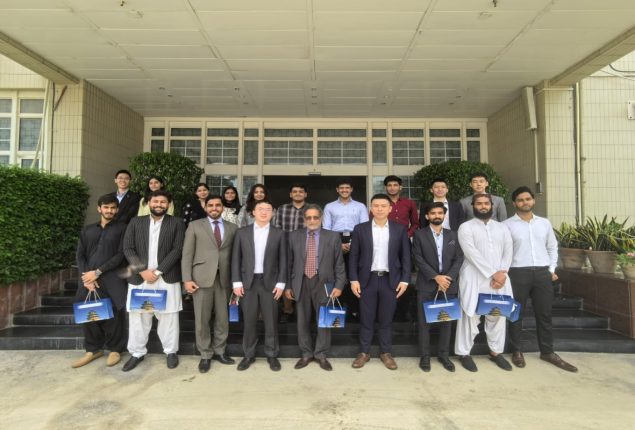
Pakistani Students Visit the Chinese Consulate
Recently I had the pleasure of visiting the Chinese Consulate in Karachi alongside a group of students from the Pakistan Council of Foreign Relations (PCFR) Youth Access Program. We engaged in wide-ranging discussions with Consulate officials on topics from economic cooperation to cultural exchange.
The delegation, which included PCFR’s Executive Director Syed Ghulam Raza and CEO Fmr. Ambassador Hassan Habib, was welcomed by the Deputy Consul General and senior staff. The visit offered a chance for participants to hear directly from Chinese diplomats on key areas of policy and cooperation between the two countries.
The conversation covered five main themes:
1. China’s modernization and its relevance for developing countries
2. The Belt and Road Initiative (BRI) and the China–Pakistan Economic Corridor (CPEC)
4. Counterterrorism in Xinjiang Province
5. China’s policies toward ethnic minorities
Officials outlined China’s rapid progress in areas such as infrastructure, technology, and urban development, noting that advances in artificial intelligence, transport systems, and sustainable city planning could serve as models for Pakistan.
On the BRI, they briefed the group on CPEC’s role as a flagship project, designed to improve regional connectivity, facilitate trade, and promote long-term economic growth.

China’s education system was also discussed in detail. Diplomats explained the nine years of compulsory schooling, the importance of vocational training, and the highly competitive “Gaokao” university entrance exam.
China remains a top destination for international students, including many from Pakistan, and officials said these exchanges help strengthen cultural ties and foster mutual understanding between the two nations.
A significant portion of the discussion focused on the Xinjiang Autonomous Region. The Chinese side provided historical background on the unrest in the area and outlined their counterterrorism strategy, which combines security measures with community engagement.
Officials spoke about initiatives to integrate the region through education, economic opportunities, and cultural preservation. They said Uyghurs in Xinjiang retain civil liberties, including freedom of language, religion, and cultural expression, and rejected Western media claims about re-education camps and human rights violations.
China’s broader ethnic policy was summarized in the slogan “56 ethnic groups, one nation,” with officials stressing equal political representation and the promotion of cultural diversity.
The visit ended with a question-and-answer session mostly centered around the potential of continued China-Pakistan collaboration in which Chinese diplomats expressed support for the Palestinian cause, affirmed solidarity with Pakistan during recent tensions with India, and highlighted opportunities for cooperation in counterterrorism, including in Balochistan.

Participants said the discussion was open and detailed, giving them a clearer understanding of China’s perspective on regional and global issues.
Speaking about the enduring Pakistan–China partnership, PCFR Executive Director Syed Ghulam Raza said:
“China and Pakistan remain to be natural allies and their relationship is not dictated by evolving regional and global constructs. Both have great potential to cooperate in an evolving world. China’s technological advancements offer great opportunities for Pakistan which is looking for technology that can complement its national growth. Innovations in agri-tech, clean energy projects, scientific techniques, electric vehicles, and sustainable practices of urban planning are some of the key areas where China established its marks and Pakistan having good relations with China can benefit from these innovations. Moreover, educational success, social security programs, and counter terrorism are other areas where Pakistan can benefit from China’s success stories. China’s BRI vision and CPEC also bring Pakistan to a point where envisioned connectivity can transform Pakistan from an economically vulnerable state to a viable regional actor. Now, it is on Pakistan, how it capitalizes evolving opportunities and meets growth targets.”
The visit concluded with the presentation of books and souvenirs to the delegation as a gesture of goodwill. Students described the event as a valuable learning opportunity that not only deepened their understanding of bilateral relations but also provided first-hand exposure to the practice of diplomacy.
While the focus was on policy and cooperation, the hospitality of the Chinese Consulate staff left a strong impression on the participants, reinforcing the sense of mutual respect that underpins Pakistan–China ties.

Read More News On
Catch all the Pakistan News, Breaking News Event and Latest News Updates on The BOL News
Download The BOL News App to get the Daily News Update & Follow us on Google News.




